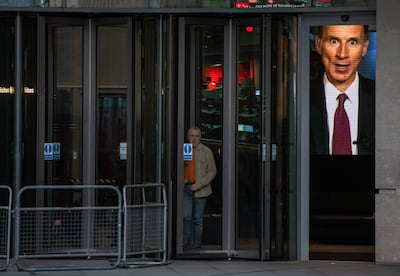Mark Carney, the Canadian-born former governor of the Bank of England, defended a decade of austerity in the UK after 2010 by saying that the country existed on the “kindness of strangers”. Kwasi Kwarteng, who was dismissed last week as the country’s chancellor of the exchequer after 38 calamitous days in the job, will go down in history as a reckless gambler with this cosy arrangement.
A product of Eton public school and Cambridge University, Mr Kwarteng tested the UK bargain with international capital to destruction. It should not have been like that. Apart from anything else, Mr Kwarteng has a doctoral thesis in the 1695 re-coinage crisis that crashed the markets the year after the Bank of England was established.
It has happened again despite the historian’s knowledge of banking, and it will take the UK years to recover what’s been lost in these weeks.
After the late September “mini-budget” that triggered the run on the pound and the crisis in UK government gilts, I spotted Norman Lamont, the last Conservative chancellor to be sacked for crashing the pound, on a London street. Now Lord Lamont, the Conservative peer looked chipper. In three decades from now, it is entirely possible that the demeanour of Mr Kwarteng will be equally sanguine. While none of us can be harbingers of fate, I’m fairly certain of it.
Which makes the moral hazard imposed by ideologues such as Mr Kwarteng for the wealth and well-being of the country all the more unpalatable. The dismissed chancellor was bumptious in power. He did none of the groundwork necessary to accomplish his ambitious attempt to reframe the UK economic model. While grounded in economic history, Mr Kwarteng and his boss, Prime Minister Liz Truss, took the view that the markets would respond positively to their announcement.
The pair had appalling timing. An inflation spiral was already causing tremors throughout global markets. The cost of energy had soared as a result of the Ukraine war. Food commodity markets were similarly blighted and feeding inflation into general prices as well.
Brexit has proved a running handicap on British trade, as firms in Europe are quietly quitting on UK customers. The pound, which was already weak, has become enfeebled. Mr Carney was quoted in a newspaper last weekend estimating that in 2016, the British economy was 90 per cent the size of Germany’s. Now six years later, it has fallen to below 70 per cent.
The Truss-Kwarteng duo came in and gave the markets special reasons to deliver further rebukes. In keeping the 2016 Brexit spirit that the country "was fed up with experts", Mr Kwarteng failed to back up his £47 billion ($52.5bn) worth of future tax cuts with benchmarking figures from the Office for Budget Responsibility. It turned out that Britain has a good, robust system of providing market transparency on its public finances. The Kwarteng method triggered unforeseen impacts on the government bond markets, in particular a debt bomb in the pensions sector that could yet go global.

The Institute for Government, a leading London-based think tank, has already published a "lessons learned" note on the calamitous chancellor. Its director, Hannah White, points out that, in making the moves that she did, Ms Truss was less interested in recognising the value of independent institutions and that she was in a “strategy designed to deflect criticism that the government has been responsible for rising interest rates”.
The UK government package had a core component of capping energy bills that, in a difficult situation, could reduce household spending on power bills from £6,000 this year to £2,500. That pledge was likely to be far costlier than the tax cuts but also served as the reason why the tax cuts were unaffordable. Now, the strategy has been completely destroyed because people are looking at monthly increases in the thousands on their mortgage bills. The crunch in what every home has to pay has started this month and, by February or March, will be truly toxic for people’s finances.
New Chancellor and former foreign secretary, Jeremy Hunt, is acting already like he will have total scope to restore the benchmarking to the public finances. In his first set of interviews, he said taxes would have to go up. He may even be tempted to try to target the energy package, reducing its scope so that the well-off are not eligible. Unless mortgage payments come back down to, on average, double what people were paying in June this year, such tinkering would be politically impossible.
Further, Chatham House, another London-based think tank, says that until now foreign policy was made with “no consideration the UK’s ability to borrow in the markets”. In a note last week, its director said this is a luxury that the country can no longer enjoy. A worsening of trade relations with the EU would be punished afresh by the markets. Similarly, a tougher line on China that bleeds into economic relations with the East Asian giant is now not a tenable option.


